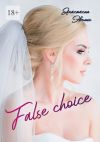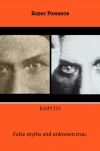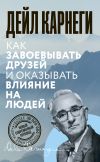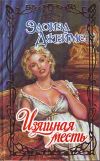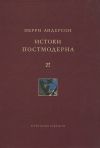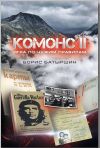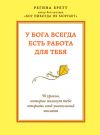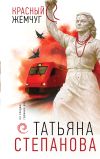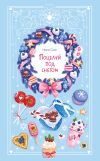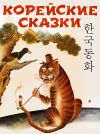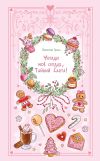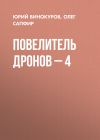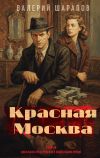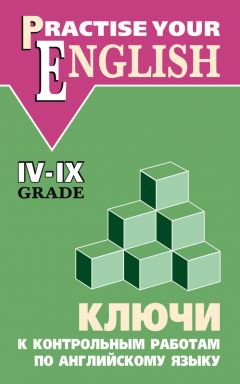
Автор книги: Ольга Акимова
Жанр: Прочая образовательная литература, Наука и Образование
Возрастные ограничения: +12
сообщить о неприемлемом содержимом
Текущая страница: 1 (всего у книги 7 страниц) [доступный отрывок для чтения: 2 страниц]
Акимова О. В.
Ключи к контрольным работам по английскому языку (IV–IX классы)
IV
Grade
Grade IV. Test 1
Reading
1.1. 1 – false; 2 – false; 3 – true; 4 – false; 5 – true; 6 – false; 7 – true; 8 – true
Use of English
1.2. Bob and Sally are from York. John is new in York. He is from Bath. Ron and Betsy are in the 5th grade. Joseph is from the village near York. Ron and Betsy are friends. They are eleven. John is eleven, too. But Bob isn’t eleven. Bob and John are friends, but they aren’t in the same class. Betsy is a lively girl. Sally isn’t lively. She is a very quiet girl.
1.3.
1. Peter is not at work at moment.
2. That is very kind of you.
3. My shoes are very dirty.
4. What colour is your car?
5. Are books expensive in your country?
6. Finland is not a very big country.
7. Those plants are very beautiful.
8. Paris is not the capital of Italy.
9. How old is your mother?
10. The beautiful old church is in the very corner of the street.
1.4. 1. their 2. your 3. his 4. your 5. their 6. their 7. her 8. our 9. your
1.5. 1. mother’s, mothers 2. hamsters, hamster’s 3. sisters, sister’s 4. friends, friend’s 5. teacher’s, teachers
1.6. 1. some 2. any 3. something 4. any/some 5. some 6. any 7. somebody 8. some/any
1.7. 1 – d; 2 – f; 3 – a; 4 —i; 5 – b; 6 – g; 7 – c; 8 – e; 9 – h
1.8. 1. autumn 2. terrible 3. bright 4. often 5. weather 6. tomorrow 7. snows 8. season 9. beautiful
Grade IV. Test 2
Reading
2.1. 1 – true; 2 – false; 3 – true; 4 – false; 5 – true; 6 – true; 7 – false; 8 – false
Use of English
2.3.
1. Have you got a bike? – Yes, I have.
2. Has Liz got a sister? – No, she has not.
3. Has Mike got a school bag? – Yes, he has.
4. Have the Greens got a new car? – Yes, they have.
5. Has Colin got my exercise-book? – No, he has not.
6. Has your friend got a brother? – Yes, he has.
7. Have you got my pencil case? – Yes, I have.
2.4. 1. There is 2. There is 3. There are 4. There is 5. There are 6. There is 7. There are 8. There is 9. There are 10. There is
2.5.
1. Does Nelly live at the seaside in summer?
Nelly does not live at the seaside in summer.
2. Does Peter go to bed late?
Peter does not go to bed late.
3. Do you buy vegetables in the market?
I do not buy vegetables in the market.
4. Does father swim in the lake?
Father does not swim in the lake.
5. Does he take Tom with him?
He does not take Tom with him.
6. Do they clean their rooms on Saturdays?
They do not clean their rooms on Saturdays.
7. Does he try to do it?
He does not try to do it.
2.6. 1. do 2. have 3. go 4. am sitting 5. is washing 6. is reading 7. visit 8. play 9. are going
2.7.
1. is practicing
Is he still playing …?
2. am using
3. Are you sleeping?
am reading
Do you often read …?
4. is shining, are singing
5. … are they doing?
is learning …
is tidying …
6. … does your husband work?
works
7. sit, am sitting
2.8. 1. meals 2. dinner 3. potatoes, tomatoes 4. porridge 5. juice 6. hungry, bread, butter 7. soup 8. ice-cream
2.9. 1. breakfast 2. bread, salt 3. hungry 4. apple 5. juice 6. meals 7. ice-cream 8. cup 9. pass 10. thirsty
2.10. 1. some 2. I had porridge 3. How much… is 4. How many 5. much 6. an apple/some apples 7. I had soup 8. is
Grade IV. Test 3
Reading
3.1. 5, 6, 2, 3, 7, 8, 4, 9, 1
Use of English
3.2. 1. this 2. that 3. these, These, those 4. this 5. these, this 6. this, these 7. these, Those 8. this, this
3.3.

3.4.
1. old, older
2. good, better, better, better, the best
3. warmest, warm, warmer, warm
4. hotter, the hotTest, hot
5. beautiful, the most beautiful, beautiful
3.5.
1. …had, last Saturday.
2. …went, last Sunday.
3. …went, yesterday morning.
4. Did, last summer.
5. …went, that winter.
6. …was, that autumn.
7. …had, yesterday.
8. …got up, yesterday morning.
9. Did, yesterday evening.
10. …did not, last Sunday.
3.6.
1. Did it snow a lot last week?
It did not snow a lot last week.
2. Did she travel a lot last year?
She did not travel a lot last year.
3. Did the shop close at 6 yesterday?
The shop did not close at 6 yesterday.
4. Did she help her Mum with the festive dinner?
She did not help her Mum with the festive dinner.
5. Did he write a lot of postcards yesterday?
He did not write a lot of postcards yesterday.
6. Did she sing a lot of popular songs yesterday?
She did not sing a lot of popular songs yesterday.
7. Did he walk all day long yesterday?
He did not walk all day long yesterday.
3.7. 1. go 2. likes 3. celebrated 4. Did, did 5. walked, was 6. doesn’t rain 7. go, come/went, came 8. writes
3.7. 1. puppy 2. mice 3. tortoise 4. domestic 5. beautiful 6. mouth 7. tail 8. wolves 9. grew 10. quickly
3.8. 1. neck 2. ears 3. legs 4. fingers, toes 5. nose/ hair 6. teeth 7. eyes 8. slowly 9. quickly 10. happy
Grade IV. Test 4
Reading
4.1. 1. to the coast 2. at the weekend 3. never 4. having fun out doors 5. Scotland 6. at the seaside 7. Italy 8. France 9. road 10. in the tent
Use of English
4.2. 1. much, many 2. many, much 3. many, many 4. many 5. much, many 6. many, much 7. much 8. much, much
4.3. 1. How old 2. What 3. Who 4. Where 5. Who 6. How many 7. Where 8. Where 9. How many 10. What 11. How old
4.5.
Ben won’t wash up at the weekend.
Ben will relax at the beach at the weekend.
Ben won’t cook supper at the weekend.
Ben will do sports at the weekend.
Ben won’t read a new book at the weekend.
Ben won’t go to the country at the weekend.
Ben won’t sleep late at the weekend.
4.6. 1. couldn’t, can 2. couldn’t 3. could 4. Could 5. can’t 6. Can, can’t 7. could/couldn’t 8. can/can’t 9. Could
4.7. 1. mountains 2. forest 3. fields 4. basketball 5. swimming 6. busy 7. week
4.8. 1. before 2. Where 3. clean my teeth 4. goes to bed 5. Yes, I will 6. weekend 7. carry my bag 8. afternoon
Grade IV. Test 5
Reading
5.1. 1 – false; 2 – true; 3 – false; 4 – false; 5 – false; 6 – false; 7 – true; 8 – false; 9 – false; 10 – false; 11 – true; 12 – false
Use of English
5.2. 1 – c; 2 – b; 3 – a; 4 – b; 5 – c; 6 – c; 7 – b; 8 – b; 9 – a; 10 – b
5.3.

5.4. 1. at 2. at 3. to, from, till 4. for at 5. at 6. on 7. to, on 8. to, from 9. with
5.5. 1. What 2. Who 3. When 4. Why 5. Where 6. Why 7. What 8. What
5.6. 1. isn’t she 2. is he 3. can’t she 4. mustn’t you 5. aren’t 6. did he 7. do they 8. won’t he 9. can she 10. were they 11. hasn’t he
5.7. 1. laughed 2. comfortable 3. uniform 4. museums 5. leaves 6. count 7. outdoors 8. famous 9. important
5.8. 1. meeting 2. comfortable 3. handicraft 4. timetable 5. book-case 6. outdoors 7. famous 8. twice
5.9. 1. meet 2. comfortable 3. classes 4. street 5. study 6. late 7. well 8. poor/good 9. flow/flow in 10. easy/difficult 11. easy 12. interesting/difficult
Grade IV. Test 6
Reading
6.1. 1 – b; 2 – c; 3 – a; 4 – b; 5 – c
Use of English
6.2. had, lived, knew, met, gave, took, went, bought, met, decided, gave, took, went, saw, did not give, went, found, entered, put, took
6.4.
1. Bob is going to the swimming pool on Friday.
2. I am not going to buy a scooter.
3. Are they going out in the evening?
4. Mum is going to buy meat for dinner.
5. Is she going to visit France in summer?
6. What are you going to do in future?
7. She is not going to leave soon.
8. Dave is going to enter the university.
6.5. 1 – b; 2 – a; 3 – b; 4 – a; 5 – b; 6 – b; 7 – b
6.6. 1. behind 2. shout 3. keys 4. armchair 5. curtains 6. mirror 7. Describe 8. opposite 9. believe 10. cupboard
6.7. 1. rather 2. locks 3. fine/nasty 4. quiet 5. happen 6. listen to 7. believe 8. long ago 9. is tasty, is true 10. I am afraid/I think
Grade IV. Test 7
Reading
7.1.
1. All the rooms of the house are a different colour and they are in funny places.
2. Downstairs there is a green room with lots of books about magic.
3. Merlin does his magic in the library.
4. The living-room is brown.
5. The kitchen is upstairs.
6. It is a funny house. All the rooms of the house are a different colour and there are stairs inside the house, and outside there is a ladder.
Use of English
7.2.
1. Where did you go yesterday?
2. Who did he take to the south?
3. Where did Mrs. Brown live in London?
4. What did Mr. Jackson do for a living in New York?
5. When did you get up in the morning?
6. When did the play start?
7. How did you get here?
8. What did you see in London?
9. What did she buy in the supermarket?
10. Whom did you see in the office?
7.3.
to begin – began – begun
to bring – brought – brought
to buy – bought – bought
to catch – caught – caught
to eat – ate – eaten
to find – found – found
to get – got – got
to give – gave – given
to go – went – gone
to have – had – had
to know – knew – known
to make – made – made
to meet – met – met
to put – put – put
to say – said – said
to see – saw – seen
to speak – spoke – spoken
to swim – swam – swum
to take – took – taken
to understand – understood – understood
to write – wrote – written
7.4. 1. have learned 2. has lived 3. has lost 4. has not attended 5. have been 6. has already finished 7. has never taught 8. have moved 9. haven’t bought 10. have gone out
7.6. 1. takes 2. doesn’t take 3. Does it take 4. won’t take 5. took 6. did it take 7. took 8. didn’t take 9. took
7.7. 1. the 2. when 3. sights 4. lots 5. too 6. old 7. famous 8. often 9. about 10. place 11. beautiful 12. word 13. wait 14. cold
7.8. 1. buildings/houses 2. bridge 3. century 4. become 5. burnt 6. monument 7. long 8. belongs 9. architect 10. noisy
7.9. 1. main 2. towns 3. traffic lights 4. for ages 5. ever 6. became 7. monument 8. taken
Grade IV. Test 8
Reading
8.1.
1. The Connors live in a big flat.
2. Tina and Carol share a bedroom.
3. Tina and Carol argue day and right.
4. Mr. Connor is making a wall through their bedroom.
5. The girls can paint everything in their rooms.
6. The two girls like different colours.
7. Carol doesn’t like the colour of Tina’s chairs.
8. Tina doesn’t like the colour of Carol’s walls.
9. Tina doesn’t like Carol’s cassettes.
10. Mr. Connor says they can have a new room in the garage.
Use of English
8.2. 1. since 2. since 3. for 4. since 5. for 6. since
7. for 8. since 9. since 10. for 11. since
8.3.
to choose – chose – chosen
to drink – drank – drunk
to spend – spent – spent
to fall – fell – fallen
to grow – grew – grown
to find – found – found
to fly – flew – flown
to steal – stole – stolen
to shine – shone – shone
to shake – shook – shaken
to forget – forgot – forgotten
to sleep – slept – slept
to teach – taught – taught
to wear – wore – worn
to think – thought – thought
8.4. 1. He has never studied 2. before 3. Has she ever seen 4. yet 5. have just read 6. so far 7. I have already been 8. recently
8.5.
1. died, worked
2. has worked
3. has studied
4. studied
5. Have you seen, have last seen
6. has just gone out, did he leave, left
7. is, have spent
8. have not had, came by, have left, started
9. Have you seen, saw
10. has lived, went
8.6. 1. must not 2. have to 3. must 4. must not 5. Do you have to 6. must 7. must not 8. have to 9. must 10. must not
8.7. 1. them 2. very 3. never 4. their 5. Once 6. to 7. all 8. with 9. lazy 10. under 11. said 12. are 13. why 14. in
8.8. 1. Travelling 2. seaside 3. friendly 4. airport 5. saddest 6. nearly 7. business 8. flight 9. booking
8.9. 1. stayed 2. cheaper 3. fantastic 4. luggage 5. explain 6. ugly 7. through 8. caught
8.10. 1. give 2. cries 3. stole 4. luggage 5. beautiful 6. visited 7. feel 8. voyage 9. miss 10. change
Grade IV. Test 9
Reading
9.1.


Use of English
9.2. 1. Have you read 2. Did you read 3. has already left 4. left 5. has bought 6. bought 7. have crossed 8. drew 9. Did you meet 10. did he say
9.3. 1. little 2. few 3. much 4. much 5. little 6. many 7. few 8. much
9.4. 1. says 2. tells 3. says 4. tells 5. says 6. tell 7. tell 8. say 9. say 10. says
9.5.
1. I’m fond of going to the museums, too.
2. I’m also fond of going to the museums.
3. She doesn’t often eat cakes.
4. I can never find my glasses.
5. What do you usually have for lunch?
6. I live in St Petersburg, too.
7. I can also speak German.
8. Have you ever been to London?
9. I haven’t been to Washington P. C. yet.
10. I always go to Red Square when I’m in Moscow.
9.6. 1. into 2. it 3. but 4. calls 5. me 6. out 7. is 8. us 9. they 10. our 11. must 12. want 13. the 14. and 15. all
9.7. 1. collection 2. writer 3. specializes 4. traveller 5. performance 6. unkind 7. unhappy 8. unimportant 9. uncomfortable 10. unfriendly
9.8. 1. collecting 2. specializes 3. applause 4. seats 5. performance, success 6. feature 7. fiction 8. imagination
9.9. 1. fond 2. coins 3. seats 4. play 5. screen 6. Unfortunately 7. famous/a success 8. though 9. writer 10. film 11. imagination
Grade IV. Test 10
Reading
10.1. 4, 6, 8, 7, 5, 2, 9, 1, 3
Use of English
10.3.
1. Nina has been a ballet dancer since 2000.
2. Jonathan hasn’t seen Ruth for five years.
3. Mr. James has worked as a dentist since 1997.
4. I have been there for three days.
5. We have been on Solovki since Wednesday.
6. Betty has stayed at her grandmother’s place since the day she came.
7. He has lived in New York since 1975.
8. I haven’t seen her since I was in Moscow.
10.4. 1. there 2. her 3. into 4. very 5. are 6. went 7. a 8. to 9. she 10. never 11. before 12. lots 13. must 14. on 15. away 16. have 17. me 18. with 19. for 20. much 21. some
10.5. 1. timetable 2. discoverer 3. sailor 4. traditional 5. afternoon 6. quietly 7. meeting 8. peaceful 9. wooden 10. friendship 11. Independence
10.6. 1. discoveries 2. reached 3. round 4. festival 5. harvest 6. peace 7. Independence 8. nature
10.7. 1. reach 2. appeared 3. island 4. hard 5. now 6. dangers 7. native 8. quiet 9. rely 10. help
Grade IV. Test 11
Reading
11.1.
1. The first daughter’s husband was a gardener.
The second daughter’s husband made pots.
2. One day the man went to see his first daughter.
3. He asked, “How are you? How is your husband?”
4. The first daughter wanted some rain because their garden was very dry.
5. The second daughter didn’t want any rain because their pots didn’t dry in the rain.
6. It was difficult to do something for their daughters because they wanted completely opposite things.
Use of English
11.2.
1. John could study all day long.
John will be able to study all day long.
2. The two girls couldn’t write correctly.
The two girls won’t be able to write correctly.
3. You couldn’t see in the darkness.
You won’t be able to see in the darkness.
4. Mrs. Willow could take care of her children.
Mrs. Willow will be able to take care of the children very well.
5. The flowers couldn’t grow without enough water.
The flowers won’t be able to grow without enough water.
6. They could live in Siberia.
They won’t be able to live in Siberia.
11.3. 1. could 2. will be able to 3. can/is able to 4. can’t/is not able to 5. could 6. can’t 7. will be able to 8. can/am able to 9. can/am able to 10. has been able to
11.4. 1. have not repaired 2. have just put 3. bought 4. went 5. didn’t take 6. forgot 7. haven’t seen, Did she run 8. filled in, haven’t got 9. got, haven’t opened 10. invited
11.5. 1. was 2. on 3. no 4. warm 5. brightly 6. did 7. to 8. under 9. said 10. and 11. very 12. with 13. time 14. must 15. answered 16. little 17. time 18. my 19. Then 20. you 21. for 22. red 23. word 24. ran 25. late
11.6. 1. news 2. personal 3. hostess 4. relaxed 5. Maybe 6. translation 7. explanation 8. national
11.7. 1. each 2. government 3. newspapers 4. own 5. advised 6. personal 7. relax
11.8. 1. states 2. Newspapers 3. magazines 4. government 5. own 6. see 7. advice 8. relaxed 9. relax
Grade IV. Test 12
Reading
12.1.
1. The fox and the crane were very good friends.
2. The dinner wasn’t good for the crane because the crane had very little soup.
3. The crane wanted to teach the fox a lesson because he couldn’t eat the soup from the large plate, and went home hungry.
4. The crane brought two tall jars with little fishes. The fox liked fish but he couldn’t take the fishes.
5. The fox couldn’t take the fishes from the tall jars and went home hungry.
Use of English
12.3.
1. How long have you known Betty?
2. How long has your friend lived in the USA?
3. How long has Lucy been a dancer?
4. How long have you known Margaret?
5. How long has Bill worked in Edinburgh?
12.5. 1. played 2. did you go 3. Have you ever been 4. have washed 5. did not like 6. has visited 7. has worked 8. went, stayed
12.6. 1. – 2. The 3. – 4. – 5. – 6. – 7. The, the 8. The 9. The, —, —
12.7. 1. in 2. day 3. something 4. was 5. saw 6. to 7. a 8. can’t 9. another 10. than 11. not 12. me 13. away 14. that 15. with 16. where 17. into 18. head 19. do 20. up 21. these 22. more
12.5. 1. bravery 2. really 3. truthful 4. greatest 5. easily 6. successful 7. devoted
12.6. 1. enemies 2. founded 3. youngest 4. battle 5. victory 6. heart 7. really 8. soul
12.7. 1. honest 2. helpful 3. close/devoted 4. win 5. battle 6. died 7. killed 8. heart 9. really
Grade IV. Test 13
Reading
13.1. 1 – true; 2 – false; 3 – false; 4 – true; 5 – false; 6 – false; 7 – false; 8 – false; 9 – false
Use of English
13.2. 1. A pupil studies. 2. A singer sings. 3. Teachers teach. 4. A painter paints. 5. Writers write.
13.3.
1. She doesn’t know the answer.
Does she know the answer?
2. He doesn’t have lunch at 1 o’clock.
Does he have lunch at 1 o’clock?
3. The flowers don’t look beautiful.
Do the flowers look beautiful?
4. He doesn’t play football well.
Does he play football well?
5. She can’t answer this question.
Can she answer this question?
13.4. 1. haven’t you 2. does she 3. do we 4. isn’t he 5. didn’t he 6. couldn’t she 7. won’t you 8. doesn’t it 9. mustn’t they 10. are there
13.5.
1. she got up at 10 o’clock
2. he was not late for school
3. she didn’t sleep well
4. she didn’t go to the cinema
5. they didn’t spend in the mountains
13.6.
1. How long did you stay there?
2. Did you stay in a hotel?
3. Did you go alone?
4. How did you travel?
5. Was the weather fine?
6. What was the weather like?
7. What did you do in the evenings?
8. Did you make new friends?
13.7. 1. am studying 2. are you wearing 3. are singing 4. is not raining 5. is coming
13.8.
1. wants, haven’t been
2. Have you read, do you think
3. Do you know, have you known, have known
13.9. 1. I have just told 2. told 3. has already written 4. wrote 5. flew, Have you seen
13.10. 1. don’t have to 2. didn’t have to 3. didn’t have to 4. won’t have to 5. must 6. mustn’t 7. had to
13.11. 1. who 2. everything 3. his 4. example 5. when 6. into 7. day 8. and 9. her 10. away 11. only 12. there 13. own 14. so 15. when 16. let 17. one 18. tell 19. had 20. unhappy 21. him 22. was 23. you
V
Grade
Grade V. Test 1
Reading
1.1. 4, 6, 8, 3, 10,9, 5, 2, 1, 7
Use of English
1.2. 1. have got 2. has got 3. has got 4. had got 5. hasn’t got 6. has got 7. had got 8. haven’t got 9. had got
1.3.
1. Have you got a credit card?
2. Have both children got bicycles?
3. Do we have a new teacher?
4. Did Bob have a good time at yesterday’s picnic?
5. Have we got a new dictionary?
6. Did ancient Romans have telephones?
7. Did the twins have breakfast yesterday morning?
1.4. 1. talked 2. went 3. wore 4. gave 5. drove 6. were ready 7. spent 8. climbed
1.5.
1. went, got out, saw, was
2. woke up, told, laughed, said, thought, was
3. put, made, invited
4. went, did, swam, went, had
5. spent, flew, learnt, began
1.6. 1. there 2. so 3. in 4. the 5. evening 6. a 7. said 8. must 9. but 10. please 11. how 12. long 13. right 14. talk 15. took 16. end 17. of 18. to 19. will 20. flew 21. silly 22. happy 23. funny 24. was 25. opened 26. down
1.8. 1. bakery 2. grocery 3. salesman 4. typist 5. occupation 6. married 7. postman 8. milkman
1.9. 1. butcher 2. greengrocer 3. nurse 4. policeman 5. sailor 6. tailor 7. baker
1.9. 1. types 2. secretary/assistant 3. married 4. outdoor/computer/different/lively 5. ancient/old/ beautiful 6. fruit 7. do 8. surname/family name
Grade V. Test 2
Reading
2.2. 1 – true; 2 – false; 3 – true; 4 – false
2.3.
1. On Friday night there was a bad storm.
2. The next morning the boys went to the beach.
2.4.
1. The boys could read the name.
2. The boat disappeared on a stormy night.
2.5.
The weather was windy.
The sky was grey.
The beach was full of bottles and boxes.
Use of English
2.6. 1. is cooking 2. is going 3. is watching 4. are playing 5. starts 6. are having 7. is coming 8. is being
2.7. 1. start 2. are eating 3. is coming 4. played 5. are wearing 6. is arriving 7. comes 8. waits 9. is passing 10. is opening, Are you looking for …
2.9.
1. Sir John always sleeps in the day.
2. He usually comes at twelve o’clock.
3. He often stays in the living room for some minutes.
4. He sometimes opens that door.
5. Oh, dear! That’s wrong. He never opens the door
2.10. 1. is walking, likes 2. is sitting, wants 3. don’t know, does/is doing 4. says, sees 5. doesn’t understand, is singing
2.11.
1. Marian and David usually stay in London. This year they are going to the Lake District on holidays.
2. Ducks usually swim. Now in winter they are sleeping.
3. Marian and David often talk with friends. Today they are going to the Lake District.
4. Aunt Susan often watches television. Today she is going shopping.
5. Children often walk to the canal. Today they are watching television.
6. John usually goes fishing. Today he is watching birds.
2.12. 1. to 2. together 3. very 4. it 5. in 6. were 7. only 8. could 9. on 10. invite 11. good 12. you 13. have 14. not 15. take 16. help 17. at 18. about 19. and 20. with 21. the
2.13. 1. running 2. washing 3. cleaner 4. conveniences 5. central 6. settlements 7. comfortable 8. bathroom 9. fireplace
2.14. 1. turn … off 2. electricity 3. conveniences 4. vacuum cleaner 5. conditioner 6. water 7. switch … on
